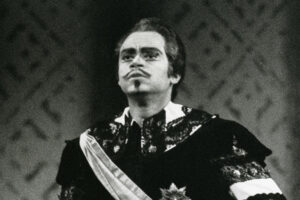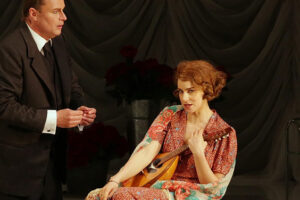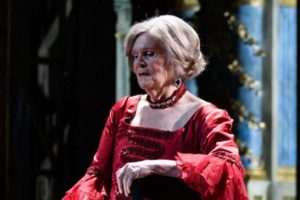
La Cieca sat in on the “Cognitive Theater” discussion tonight at the New York Public Library, and the main impression she came away with is that Patrice Chéreau is a very quiet, soft-spoken man who happens to be a genius. (She was expecting something more fiery, but like many of the great divas, it seems this stage director saves his “flame” for the work.)
Luc Bondy came off as a serious artist who either has run out of particularly interesting things to say in his work or else (maybe more likely) not a good fit for directing Tosca. Neither he nor Chéreau are in any sense opera queens, which is maybe more off-putting to other people than it is to me.
Bondy did say that he thought (and he seemed to be weighing his words carefully here) that Tosca is a “wonderful and awful” opera with some “completely stupid” moments: a “good, thrilling” piece but a “trivial” story. The weak moments of the opera can be glossed over, like bad food with a rich sauce, which Bondy said was, as he understood it, Zeffirelli’s approach. (The takeaway snipe of the evening was in reference to the Zef: “He should remember Puccini wrote this opera, not Zeffirelli.”)
He wanted, he said, to try for a “human” approach, to make the action more believable. This is the source of Tosca’s finding the knife early, for example: Bondy feels that as written the melodrama is too “convenient.” He added that he did not realize that in New York Tosca was like the Bible.
A lot of back and forth about booing, and Chéreau was rather gallant here in recalling the Bayreuth Ring, though it’s scary to think that this was now 33 years ago! (Scary to me, I mean. He seemed all right with it.) Nobody wants to make a scandal, they all assured us, what they try to do is to tell the story. Bondy did say that the audience reaction was not particulary important because by the time the audience sees the production, his work is completely done. He added a funny analysis of why booing sounds so loud even when only a few people do it: the “r” in “bravo” interrupts the sound, whereas the “oo” in boo projects very well.
Bartlett Sher was a little more PC and, in the American style, very verbal about his concept for Les Contes d’Hoffmann. His point of departure is Offenbach’s outsider status as a Jew; he sees Hoffmann’s successive romances as attempts at assimilating into mainstream society. The production for the Met will have something of a 1920s feel because of a connection to Kafka that I didn’t quite get.
Again, Chéreau didn’t have any real “aha!” moments, but he sounded like he was very in touch with From the House of the Dead, how when he first looked at the work he expected a lot of “despair” but was surprised by how “full of hope and life” the work is. He took on directing it because Pierre Boulez asked him to collaborate on the conductor’s last operatic production. (Gelb says he invited Boulez to the Met but he declined.) Chéreau did emphasize that the Met production was not a revival in the conventional sense but rather a reworking of similar ideas, stimulated in particular by the different abilities and qualities of the New York cast, specifically Peter Mattei.
The interlocutor, Paul Holdengräber, got things off to a bit of a grating start for me when he drawled, “As de La Rochefoucauld once said…” and he could have spared us the anecdote about how his father was a claquer in Vienna. But mostly he asked the expected questions about missions and stuff.
Few revelations were forthcoming from Peter Gelb: he wants to build new audiences but not alienate old audiences, he does not believe in scandal for scandal’s sake, success of a production is measure in terms of audience interest over the course of a number of seasons. Some boilerplate about the success of the HD telecasts. The Met standard is the best voices in the world, the finest orchestra, heard in their full glory.
The questions from the audience ran the usual gamut from the incomprehensible to the asinine, but there was at least one good, straightforward query as to the future of the iconic Zeffirelli Bohème. Gelb answered, “There is no production at the Met that will not eventually be redone.”
Please see also the observations of squirrel and rommie. And Daniel Wakin was there too.
























Comments